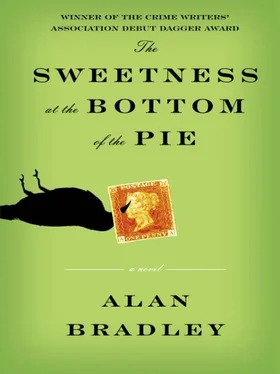Alan Bradley - The Sweetness at the Bottom of the Pie
Здесь есть возможность читать онлайн «Alan Bradley - The Sweetness at the Bottom of the Pie» весь текст электронной книги совершенно бесплатно (целиком полную версию без сокращений). В некоторых случаях можно слушать аудио, скачать через торрент в формате fb2 и присутствует краткое содержание. Жанр: Старинная литература, на английском языке. Описание произведения, (предисловие) а так же отзывы посетителей доступны на портале библиотеки ЛибКат.
- Название:The Sweetness at the Bottom of the Pie
- Автор:
- Жанр:
- Год:неизвестен
- ISBN:нет данных
- Рейтинг книги:3 / 5. Голосов: 1
-
Избранное:Добавить в избранное
- Отзывы:
-
Ваша оценка:
- 60
- 1
- 2
- 3
- 4
- 5
The Sweetness at the Bottom of the Pie: краткое содержание, описание и аннотация
Предлагаем к чтению аннотацию, описание, краткое содержание или предисловие (зависит от того, что написал сам автор книги «The Sweetness at the Bottom of the Pie»). Если вы не нашли необходимую информацию о книге — напишите в комментариях, мы постараемся отыскать её.
The Sweetness at the Bottom of the Pie — читать онлайн бесплатно полную книгу (весь текст) целиком
Ниже представлен текст книги, разбитый по страницам. Система сохранения места последней прочитанной страницы, позволяет с удобством читать онлайн бесплатно книгу «The Sweetness at the Bottom of the Pie», без необходимости каждый раз заново искать на чём Вы остановились. Поставьте закладку, и сможете в любой момент перейти на страницу, на которой закончили чтение.
Интервал:
Закладка:
"What do you know about Horace Bonepenny?" he asked in a chill tone.
"Quite a lot, actually," I said.
Then, surprisingly, the fight went out of him all at once, just like that. One moment his cheeks were puffed out like the face of the winds that blow across medieval maps, and the next they were as hollow as a horse trader's. He sat down on the edge of the bunk, spreading out the fingers of one hand to steady himself.
"I overheard your disagreement in the study," I said. "I'm sorry if I eavesdropped. I didn't mean to, but I heard voices in the night and came downstairs. I know that he tried to blackmail you. I heard the quarrel. That's why I told Inspector Hewitt that I killed him."
This time it filtered through to Father.
"Killed him?" he asked. "What do you mean, killed him?"
"I didn't want them to know it was you," I said.
"Me?" Father said, rocketing up off the bed. "Good Lord! Whatever makes you think I killed the man?"
"It's all right," I said. "He most likely deserved it. I'll never tell anyone. I promise."
With my right hand I crossed my heart and hoped to die, and Father stared at me as if I were some monstrous wet creature that had just flopped out of a painting by Hieronymus Bosch.
"Flavia," he said. "Please understand this: Much as I should have liked to, I did not kill Horace Bonepenny."
"You didn't?"
I could scarcely believe it. I had already come to the conclusion that Father must have committed murder, and I could see that it was going to be hard cheese admitting I was wrong.
Still, I remembered that Feely had once told me that confession was good for the soul—this while she had my arm bent behind my back trying to force me to tell her what I had done with her diary.
"I overheard what you said about killing your housemaster, Mr. Twining. I went to the library and looked it up in the newspaper archives. I talked to Miss Mountjoy—she's Mr. Twining's niece. She remembered the names Jacko and Horace Bonepenny from the inquest. I know that he stayed at the Thirteen Drakes and that he brought a dead jack snipe from Norway hidden in a pie."
Father shook his head slowly and sadly from side to side, not in admiration of my detective skills, but like an old bear that has been shot yet refuses to lie down.
"It's true," he said. "But do you really believe your father capable of cold-blooded murder?"
When I thought about it for a moment—actually thought about it—I saw how foolish I had been. Why had I not realized this before? Cold-blooded murder was just one of the many things Father was incapable of.
"Well. no," I ventured.
"Flavia, look at me," he said, but when I looked up and into his eyes, I saw, for an unnerving instant, my own eyes staring back at me and I had to look away.
"Horace Bonepenny was not particularly a decent man, but he did not deserve to die. No one deserves to die," Father said, his voice fading out like a distant broadcast on the shortwave, and I knew that he was no longer speaking only to me.
"There is already so much death in the world," he added.
He sat, looking at his hands, each thumb stroking the other, his fingers engaging like the cogs of an old clock.
After a time he said, “What about Dogger?”
"He was there too," I admitted. "Outside your study."
Father gave a groan.
"That is what I feared," he whispered. "That is what I feared more than anything."
And then, as the rain swept in sheets across the windowpane, Father began to talk.
15
AT FIRST FATHER'S UNACCUSTOMED WORDS CAME slowly and hesitantly—jerking into reluctant motion like rusty freight cars on the railway. But then, picking up speed, they soon smoothed out into a steady flow.
"My father was not an easy man to like," he said. "He sent me away to boarding school when I was eleven. I seldom saw him again. It's odd, you know: I never knew what interested him until someone at his funeral, one of the pallbearers, chanced to remark that his passion had been netsuke. I had to look it up in the dictionary."
"It's a small Japanese carving in ivory," I said. "It's in one of Austin Freeman's Dr. Thorndyke stories."
Father ignored me and went on. “Although Greyminster was no more than a few miles from Buckshaw, in those days it might just as well have been on the moon. We were fortunate indeed in our headmaster, Dr. Kissing, a gentle soul who believed no harm could ever come to the boy who was administered daily doses of Latin, rugger, cricket, and history, and on the whole, we were treated well.
"Like most, I was a solitary boy at first, keeping to my books and weeping in the hedgerows whenever I could get away on my own. Surely, I thought, I must be the saddest child in the world; that there must be something innately horrid about me to cause my father to cast me off so heartlessly. I believed that if I could discover what it was, there might be a chance of putting things right, of somehow making it up to him.
"At night in the dorm I would tunnel under the blankets with an electric torch and examine my face in a stolen shaving mirror. I couldn't see anything particularly wrong, but then I was only a child and not really equipped to judge these things.
"But time went on, as time does, and I found myself being swept up into the life of the school. I was good at history but quite hopeless when it came to the books of Euclid, which put me somewhere in the middle ranks: neither so proficient nor so stupid as to draw attention to myself.
"Mediocrity, I discovered, was the great camouflage; the great protective coloring. Those boys who did not fail, yet did not excel, were left alone, free of the demands of the master who might wish to groom them for glory and of the school bully who might make them his scapegoat. That simple fact was the first great discovery of my life.
"It was in the fourth form, I think, that I finally began to take an interest in the things around me and, like all boys of that age, I had an insatiable taste for mystification, so that when Mr. Twining, my housemaster, proposed the founding of a conjuring circle, I found myself suddenly ablaze with new enthusiasm.
"Mr. Twining was more kindly than adept; not a very polished performer, I must admit, but he carried off his tricks with such ebullience, such good-hearted enthusiasm, that it would have been churlish of us to withhold our noisy schoolboy applause.
"He taught us, in the evenings, to turn wine into water using no more than a handkerchief and a bit of colored blotting paper; how to make a marked shilling vanish from a covered drinking glass before being extracted from Simpkins's ear. We learned the importance of 'patter,' the conjurer's line of talk, as it were; and he drilled us in spectacular shuffles which left the ace of hearts always at the bottom of the pack.
"It goes without saying that Mr. Twining was popular; loved might be a better word, although few of us at the time had seen enough of that emotion to recognize it for what it was.
"His greatest recognition came when the headmaster, Dr. Kissing, asked him to get up a conjuring show for Parents' Day, a happy scheme into which he threw himself wholeheartedly.
"Because of my prowess with an illusion called 'The Resurrection of Tchang Fu,' Mr. Twining was keen to have me perform it as the grand finale of the show. The stunt required two operators, and for that reason he allowed me to choose any assistant I wanted; that was how I came to know Horace Bonepenny.
"Horace had come to us from St. Cuthbert's after a fuss at that school about some missing money—just a couple of pounds, I believe it was, although at the time it seemed a fortune. I felt sorry for him, I admit. I felt he had been misused, particularly when he confided to me that his father was the cruelest of men and had done unspeakable things in the name of discipline. I hope this is not too coarse for your ears, Flavia.”
Читать дальшеИнтервал:
Закладка:
Похожие книги на «The Sweetness at the Bottom of the Pie»
Представляем Вашему вниманию похожие книги на «The Sweetness at the Bottom of the Pie» списком для выбора. Мы отобрали схожую по названию и смыслу литературу в надежде предоставить читателям больше вариантов отыскать новые, интересные, ещё непрочитанные произведения.
Обсуждение, отзывы о книге «The Sweetness at the Bottom of the Pie» и просто собственные мнения читателей. Оставьте ваши комментарии, напишите, что Вы думаете о произведении, его смысле или главных героях. Укажите что конкретно понравилось, а что нет, и почему Вы так считаете.












